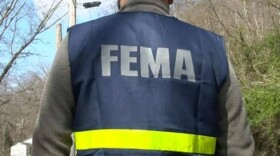MELISSA BLOCK, HOST:
From NPR News, this is ALL THINGS CONSIDERED. I'm Melissa Block.
AUDIE CORNISH, HOST:
And I'm Audie Cornish.
In Detroit, a small, struggling aquarium is getting a little help from friends in Washington, D.C. The National Aquarium closed in September after more than 100 years. While its octopus and sea turtle found homes in other cities, tens of thousands of dollars worth of fake coral and fiberglass tank decorations went to Detroit. The volunteers who now run the aquarium there hope the salvage supplies will help its century-old facility regain some of the luster it's lost. Sarah Hulett of Michigan Radio reports.
SARAH HULETT, BYLINE: Detroit's Belle Isle Aquarium is beautiful and historic. The elaborately carved limestone entrance features the Roman god Neptune. Inside, the curved ceilings and central dome are line with gorgeous green glass tiles. Architecture buffs visit here because it's an Albert Kahn-designed Beaux-Arts treasure. But it is short on some of the things that make aquariums, well, aquariums.
JENNIFER BOARDMAN: You're seeing a lot of artwork and you're seeing a lot of things that are not fish in these tanks.
HULETT: That's aquarium volunteer Jennifer Boardman explaining why nearly half the tanks don't have fish or water, for that matter. One of the tanks holds memorabilia from the early 20th century when this place was one of the premiere aquariums in the country. But this aquarium is no longer much of a tourist draw. It's only open for a few hours every Saturday.
Until 2012, it was closed for seven years. And while the city still owns it, it can't afford to run it. A public aquarium has a hard time competing for tax revenues in a place where there aren't enough cops and most of the street lights are broken. So the city shut it down in 2005.
BOARDMAN: And we had aquariums from across the country come to us and take our things away. And it was heartbreaking. It was so hard.
HULETT: So Boardman says when she heard that the National Aquarium in Washington, D.C. would close, she empathized. But...
BOARDMAN: I thought, wow, I wonder if they're taking everything with them.
HULETT: Turns out they weren't. And a crew of volunteers from Detroit went to D.C. to scavenge supplies for their tanks.
VANCE PATRICK: 1904 stairs. Hold the rails.
HULETT: Vance Patrick, another volunteer, leads me down to the aquarium's basement to look at what they brought back.
PATRICK: This was the freighter that we had to cut in half to bring back with us. And each section here is about 250 pounds.
HULETT: A fiberglass model of a freighter, that is, made to decorate a large tank. Also, a piece made to look like a World War II fighter plane. Patrick says when the National Aquarium commissioned this stuff, it wasn't cheap. The fighter plane, for instance...
PATRICK: That was $28,000, just for that one piece.
HULETT: For aquariums, the big expense is not necessarily the fish. It's all the infrastructure to keep things running. Back upstairs today, families are filling the aquarium hallway.
ZOE CAMPBELL: I feel like I'm underwater, like in a pond.
HULETT: That's 12-year-old Zoe Campbell visiting with her parents. She says she's been to other bigger aquariums, aquariums that mount lavish exhibitions with sharks and elaborate displays with cafeterias, even IMAX theaters. But Zoe says there's something about this place.
CAMPBELL: It feels like less crowded. And we didn't have to wait, like, two hours in line.
HULETT: So its size is manageable, as is the cost of admission. It's free. Richard Kik is the aquarium's one and only paid employee. He has a modest, 10-year plan.
RICHARD KIK: All the tanks filled, filled with fish all over the place, have happy smiling kids around.
HULETT: Kik came one step closer to that goal this past weekend when the aquarium put two newly acquired electric eels on display. The electric eel tank was one of the aquarium's big attractions before it closed. It's a small sign of progress in a place that, these days, celebrates every little bit of good news. For NPR News, I'm Sarah Hulett in Detroit. Transcript provided by NPR, Copyright NPR.








